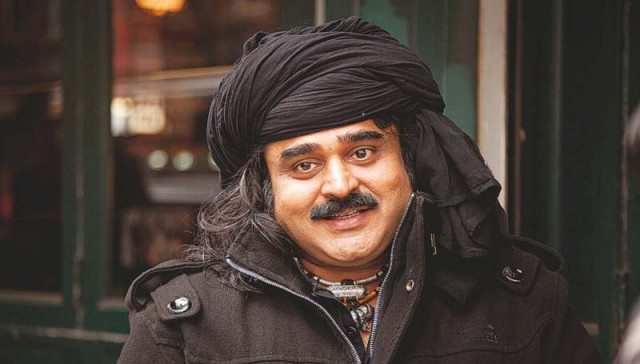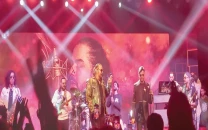There is a need for more shows like Coke Studio: Arif Lohar
Arif Lohar owes career boost to the platform, says folk music will never lose relevance

Despite achieving so much over the years, Arif feels his destination is still far away. PHOTO: FILE
While the philosophy and impact of Coke Studio are open to debate, there is no denying that the show has rescued many veteran musicians from drowning into obscurity and has almost rebranded them for the newer generation. The show, has indeed produced several icons.
When you think of Coke Studio’s success stories, folk singer Arif Lohar’s name is the first that comes to the mind. Arif is not an amateur in the world of Pakistani music. He has been around for decades, shouldering the legacy of his father Alam Lohar with grace. “Although the world knows me as a folk singer and also recognises me with the services of my father, in reality, it was Coke Studio that brought me centre stage,” he tells The Express Tribune. Arif feels the need for more shows along the lines and says adopting modern techniques is vital for keeping Pakistani music alive. “If I get the opportunity to sing for Coke Studio again, I will go for it.” His fondness for the show can be explained from the fact that Coke Studio’s first major hit that took the internet by storm, Alif Allah, saw Arif steal the show in his natural element.
Rushk: The sound of synergy

Arif started out his career under the guidance of his father and has, over the years, released around 155 studio albums, sung as many as 4,000 songs and performed in over 60 countries. However, things changed dramatically for the Pride of Performance recipient when Coke Studio came knocking on the door. “Folk music is still as relevant as it was many years ago,” he says. Arif refuses to accept that folk music is seeing a decline. He feels adopting modern trends is the way forward even for traditional musicians. “This is will help gain international recognition. Yes, we do include modern instruments but my chimta is still in my hands ... that’s my identity and I cannot let go of it,” he adds.
Despite achieving so much, Arif feels he still has a long way to go. “I am still struggling and doing my best. I believe the destination is still far away,” he maintains. He is of the view that he is nowhere near what his father achieved and it is his footsteps that he is trying to follow.
‘Tajdar-e-Haram was produced by Shiraz Uppal’
The stereotyping of folk musicians irks Arif as much as it disturbs other puritans like him. “Shrines and festivals are breeding grounds of folk singers; however, it isn’t right to restrict them to those circles only.” To him, folk singers represent a vivid part of local culture. “I travelled world over and even appeared in Coke Studio but I did not stop performing at shrines and traditional festivals. A lot has changed over the years but it all boils down to these basics,” he says. Citing examples of folk giants like Tufail Niazi, Pathanay Khan, Allan Faqir, Attaullah Essakhelvi, Shaukat Ali, Akram Rahi and his father, Arif maintains that these very breeding grounds gave Pakistan artistes like them.
He also feels that artists in general and folk musicians in particular, are not treated with the same respect as they once were. “I have seen the time of my father when no one would dare cross his path. But today the situation is very different.” He believes India, too, is treading on the same course. “You have to understand that folk music is deeply embedded in the cultural thrust of the region. It has no replacement,” Arif adds.
Published in The Express Tribune, January 23rd, 2016.
Like Life & Style on Facebook, follow @ETLifeandStyle on Twitter for the latest in fashion, gossip and entertainment.



















COMMENTS
Comments are moderated and generally will be posted if they are on-topic and not abusive.
For more information, please see our Comments FAQ